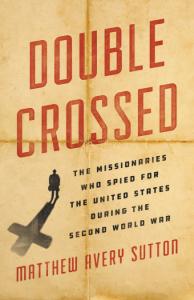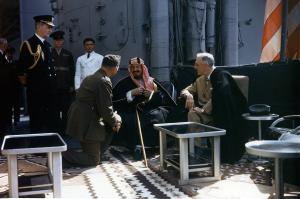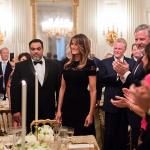In Double Crossed: The Missionaries Who Spied for the United States during the Second World War, Matthew Sutton explores a unique set of secret agents. Recruited by William “Wild Bill” Donovan’s Office of Strategic Services (the forerunner of the Central Intelligence Agency), they sought to serve God and their country and believed they could do so through espionage and diplomacy.
 The cast:
The cast:
William Eddy was the son of Presbyterian missionaries to Lebanon, a WWI veteran, a professor and college president. Eddy spearheaded OSS work in Morocco and later became a key figure in the U.S. government’s courtship of the Saudi monarchy toward the end of the war.
John Birch was (another) son of Presbyterian missionaries, apostatized from the truth faith to Baptist fundamentalism, and was educated at Mercer University. Birch went to China under the auspices of J. Frank Norris’s World Fundamental Baptist Missionary Fellowship, then served with both the China Air Taskforce and the OSS, providing invaluable on-the-ground reconnaissance.
Stewart Herman Jr., Lutheran became pastor of the American Church in Berlin. Like many Americans in Germany, he was slow to recognize the depth of Nazi evil and cool toward the plight of Germany’s Jews. After the American entrance into the war, Herman briefly became a prisoner. After his return to the U.S., the OSS recruited him to assist with its Central European Operations, “looking for German soldiers [he] could turn into effective intelligence agents.”
Stephen Penrose Jr. was the son of a Congregationalist minister and college president; he taught at the American University in Beirut. Penrose was instrumental in pushing Allen Dulles to recruit missionaries and ministers as OSS agents, and he, like Eddy, helped formulate U.S. policy in North Africa and the Middle East.

It was not without reason that the U.S. government considered missionaries and ministers as covert operatives. They often spoke languages, and they had ready covers for being in remote and unusual locations. They were also willing to sacrifice and already skilled at a certain amount of secrecy and discretion.
Sutton alerts readers at the outset to the morally fraught nature of this enterprise. Could missionaries lie? Could they kill? To whom did they owe their highest loyalty? These were questions faced by many laypeople as well, but ministers and missionaries faced them more acutely. At times, Sutton suggests that his subjects erred by conflating the cause of Christ and Uncle Sam: “the OSS missionaries thought they were doing the right thing. History teaches us that perhaps they were wrong.” At other times, though, Sutton recognizes their bravery and sometimes indispensable service against evil. “We can be grateful,” he writes in conclusion “that during World War II, American missionaries carried dung bombs and poison pills with their Bibles, and some even hatched assassination plots.” Sutton cites Reinhold Niebuhr’s Christian realism as a rationale for such actions. In a world full of sin, Christians – themselves sinners – sometimes have to employ violence to prevent the triumph of tyranny.
Temperamental and theological opposites, Eddy and Birch are the linchpins of Double Crossed. They were both skilled with languages, Eddy speaking perfect Arabic and Birch Chinese. Birch’s wartime life exceeded Eddy’s in danger. He traveled behind Japanese lines to rescue downed American pilots and to rain down bombs on Japanese troops and supplies. Eddy’s life rarely lacked drama, though. For instance, he helped organize the 1945 meeting between the Saudi king and FDR.
Eddy had few qualms about his actions during the war. Birch, by contrast, wanted to take the gospel to Tibet after the war. “This sounds pompous and self-righteous,” he wrote a love interest, “but this secret police business, necessary as it may be, has always seemed to me a slimy sort of job. No, ma’am, I’d rather be a poor preacher.” Sutton writes a gripping account of Birch’s execution at the hands of Chinese Communists, whom the fervent missionary and anti-communist had insulted by calling them “bandits.” His death served as the inspiration for the right-wing anti-communist society that bore his name, formed in 1958 by Robert Welch, who called Birch the first casualty of the Cold War.
When he reflects on the postwar development of the CIA, influenced by Eddy and Penrose, Sutton suggests that “perhaps the nation would have been better served by men of great doubt. Perhaps a fundamentalist like John Birch, with his dark view of the future and his sense that humans were inherently depraved, would have insisted on more checks and balances on the nation’s new intelligence agency.” Perhaps. I cannot remember another academic historian who has suggested that what the CIA needed was more influence from fundamentalist anti-communist zealots.
Double Crossed is the work of a historian at the top of his game who is unafraid to adapt his style and prose for general readers. Certainly, Sutton makes an important academic contribution alongside other studies which have captured the significance of religion in understanding twentieth-century U.S. foreign policy. His archival spadework is first rate as well, and few historians would recreate the religious lives of these missionaries with as much nuance and empathy.
But what really stands out to me is just how much pleasure it was to read Double Crossed. I have been enjoying Sutton’s work for many years, starting with his dissertation-turned-first-book Aimee Semple McPherson. Sutton’s prose was always clear and accessible, but Double Crossed is different in tone and form than both his first book and his American Apocalypse. The chapters are shorter, and the prose flows even more readily. Double Crossed is also full of detail and quirks, from the twist and turns in his subjects’ love lives to an OSS plan to use luminescent racoons and foxes to terrify Japanese troops. In other words, the book ably rises to its subject matter.













